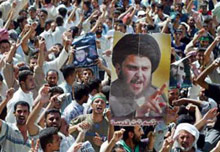|
Najaf Battle Cements Sunni-Shiite Bonds: Expert
 |
|
The battle is still raging in Najaf
|
Additional
Reporting By Hadi Yahmid, IOL Correspondent
PARIS, August 17 (IslamOnline.net & News Agencies) – As a decreased
delegation of Iraqi political and religious leaders arrived Tuesday,
August 17, in the Shiite city of
Najaf
in a bid to end almost two weeks of pitched battles between US-led
Iraqi forces and Mehdi Army, analysts believe that the Najaf battle
will form the nucleus of Sunni-Shiite resistance front.
In
an interview with IslamOnline.net, Olivier Roy, a French expert on
Islamic movements, said the latest developments in the Shiite holy
city help cement the bonds of the Sunni and Shiite resistance against
the US-led occupation of
Iraq
.
“But
the question is whether the second uprising of Sadr’s militias will
come to an end if the
US
occupation authorities and the interim Iraqi government strike a
deal,” added the author of the “Globalized Islam”.
Heavy
fighting shook the historic heart of Najaf early Tuesday as gunfire
crackled and mortars crashed through the city from around 9:30 am
(0530 GMT) and appeared to be concentrated near the shrine of Imam
Ali, where Sadr's militiamen are holed up in a stand off with US-led
Iraqi forces.
Earlier,
Najaf's police chief threatened to storm the shrine unless the Mehdi
Army disarm and leave of their own accord.
“We
will storm the shrine and kill each one of them if they do not disarm
and leave the province,” Ghalib Al-Jazairi said.
The
US
occupation forces launched
a sweeping offensive Thursday, August 12, in a bid to crush
down the uprising of the Mehdi Army.
Sadr’s
Charisma

|
|
Najaf battle added to Sadr’s popularity |
Roy
further said Najaf battle and the praiseworthy steadfastness of Mehdi
Army in the face of the
US
military juggernaut added to Sadr’s charisma.
“He
is a charismatic leader, no doubt about that,”
Roy
told IOL. “The Sunni resistance doesn’t mind at all forging an
alliance with his Mehdi Army.”
“Now
the
US
occupation forces are facing the national Islamic resistance, which is
united by one goal: the liberation of the homeland.”
Iraqi
Sunni and Shiite leaders slammed the Najaf clashes as a “bloodbath”
and called upon the international community to rein in the American
forces in
Iraq
.
The
bloody
US
offensive, described by law experts as amounting
to genocide, came amid signs of serious cracks among the ranks
of the Iraqi government.
The
deputy governor of Najaf resigned, in protest at the “terrorist”
acts of the US occupation forces as deadly raids into the holy
city has left hundreds of Shiite fighters and civilians killed.
Iraqi
Delegation
Meanwhile,
a delegation of Iraqi political and religious leaders arrived Tuesday
Najaf in a bid to end peacefully the current standoff between Sadr and
the interim Iraqi government of Iyad Allawi.
The
eight-member team, led by Sadr’s relative Sheikh Hussein Al-Sadr,
hopes to meet Sadr to relay a call from a national conference to
disarm his militia and leave the holy shrine of Imam Ali, Reuters news
agency reported.
The
delegation decided not to travel by road to Najaf after alleged
threats against them.
The
Iraqi National Conference put forward Monday, August 16, a new peace
initiative with Sadr to defuse a 12-day standoff in the holy city of
Najaf
.
Most
of the summiteers have called
on Sadr to leave the Imam Ali Shrine and relinquish the holy
sites to the interim Iraqi government.
The
Baghdad conference is expected to pick an assembly Tuesday to
oversee the interim government until January elections, but Najaf has
dominated the three-day gathering of 1,300 delegates.
Meanwhile,
Sadr welcomed Pope John Paul II intervention to solve the crisis in
Najaf, following a
Vatican
offer to mediate to avoid further bloodshed and destruction.
“We
welcome the offer from the pope at the
Vatican
and we invite him to solve the crisis,” Sadr spokesman Ahmad
Al-Shaibani said.
On
Saturday, August 14, a spokesman for Sadr said the Shiite leader was
ready to accept a United Nations force in
Iraq
as peace talks between Mehdi Army and the government broke down.
“We
prefer the United Nations to the [US-led] occupation forces, because
Iraq
is a member of the United Nations,” Sheikh Ahmad Al-Shaibani said.
“There
is a big difference between the blue helmets (of UN troops) and the
occupation troops.”
|